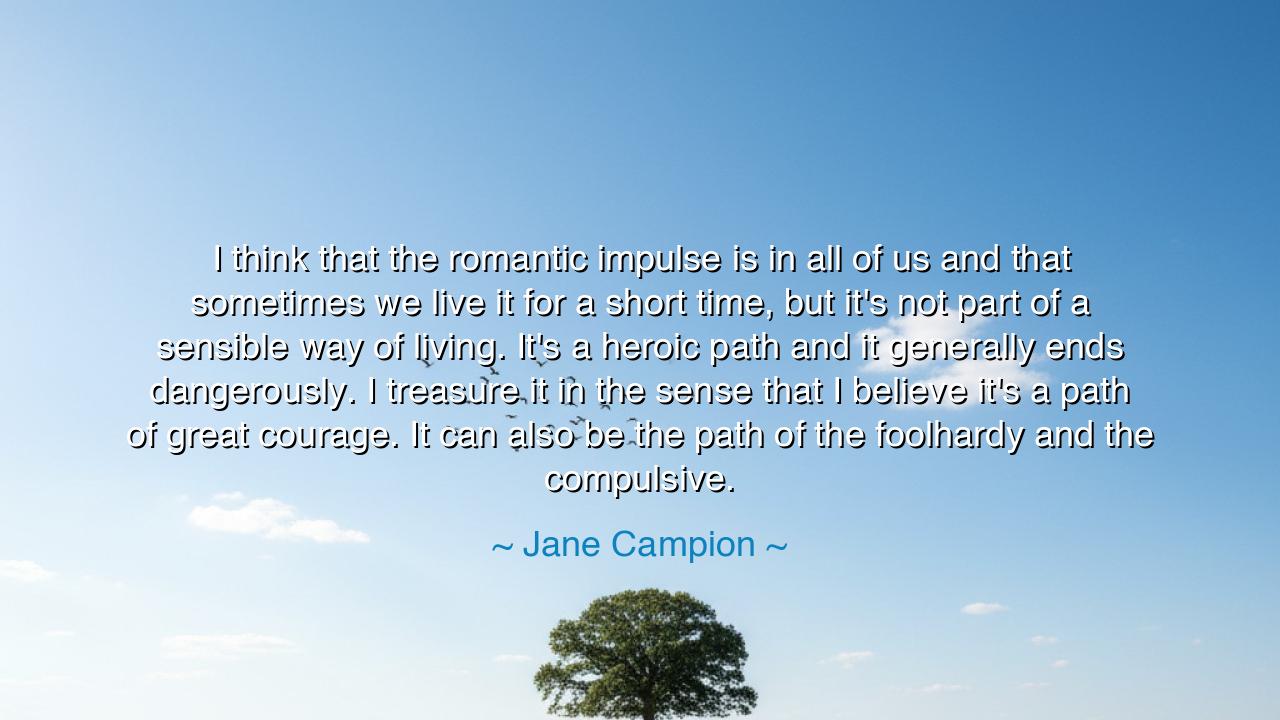
I think that the romantic impulse is in all of us and that
I think that the romantic impulse is in all of us and that sometimes we live it for a short time, but it's not part of a sensible way of living. It's a heroic path and it generally ends dangerously. I treasure it in the sense that I believe it's a path of great courage. It can also be the path of the foolhardy and the compulsive.






On the Nature of the Romantic Impulse — A Teaching of the Ages
In the depths of every human heart dwells a romantic impulse, a flame ancient as the first dawn, restless as the sea. It is the desire to live not by reason, but by passion, to defy the measured rhythm of ordinary existence and embrace the whirlwind of feeling. The wise and visionary Jane Campion spoke truly: this impulse is both a treasure and a peril, a noble fire that can illuminate or consume. It is the yearning to live heroically, to touch beauty even if it burns the hand that reaches for it.
In the days of old, poets and warriors alike bowed before this force. Achilles, swift and radiant, chose a short life of glory over a long life of peace. He sought not safety, but the splendor of an immortal name. His was the heroic path, the path of courage—and folly. His passion for honor brought him to greatness, yet also to his doom. So it is with those who yield to the romantic impulse: they live intensely, briefly, and dangerously. Their spirits blaze like comets, and though they fall, their light remains to guide or warn those who follow.
Yet Campion, in her quiet wisdom, does not condemn the romantic spirit. She calls it a path of great courage. To follow the call of the heart in a world ruled by prudence is an act of bravery. It is to defy the iron law of survival for the sake of meaning. But she warns, too, that such a path is not sensible—for the world exacts a price for every act of passion. To love wildly, to create recklessly, to dream without caution: these are divine acts, but they tear the mortal heart asunder.
Consider the story of Frida Kahlo, whose life burned with this dual fire. Her love for Diego Rivera was tempestuous, her art an offering to pain and ecstasy alike. She lived through agony and betrayal, yet her paintings pulse with life unrestrained. In her, the romantic impulse became a sacred wound—both her suffering and her salvation. Frida’s path, like Campion’s words, teaches us that passion and danger are twins. To live romantically is to walk with beauty in one hand and destruction in the other.
But not all are called to such peril. Campion speaks to the balance between the heroic and the sensible. The sensible life builds, preserves, endures. It is the rhythm of the seasons, the quiet tending of the hearth. The heroic life, by contrast, is a lightning strike—magnificent, but fleeting. The ancients knew that both are needed: Apollo’s order and Dionysus’s madness, the reason of day and the rapture of night. Wisdom lies not in rejecting passion, but in honoring it without becoming its slave.
So let us treasure the romantic impulse, as one might cherish a sacred sword—beautiful, powerful, but to be drawn with care. Let it remind us that life is more than mere survival, that love and art demand risk. Yet let us also temper the heart with thought, for even courage must bow to balance. The one who lives only by passion burns out; the one who lives only by reason never burns at all.
The lesson, then, is this: live with fire, but not in flames. Seek the moments that awaken your soul—the poem written in a rush of joy, the journey begun without map or plan—but return, too, to the steadiness of earth and home. Do not fear the romantic within you, but guide it, as a sailor steers by the stars yet keeps watch on the waves. For courage is not recklessness, and passion is not ruin, when wisdom holds the helm.
Thus speaks the voice of the ancients through Campion’s modern truth: that in each of us dwells both the foolhardy dreamer and the measured sage. The art of life is not to silence one for the other, but to let them dance—wildly, briefly, beautifully—beneath the eternal sky.






AAdministratorAdministrator
Welcome, honored guests. Please leave a comment, we will respond soon